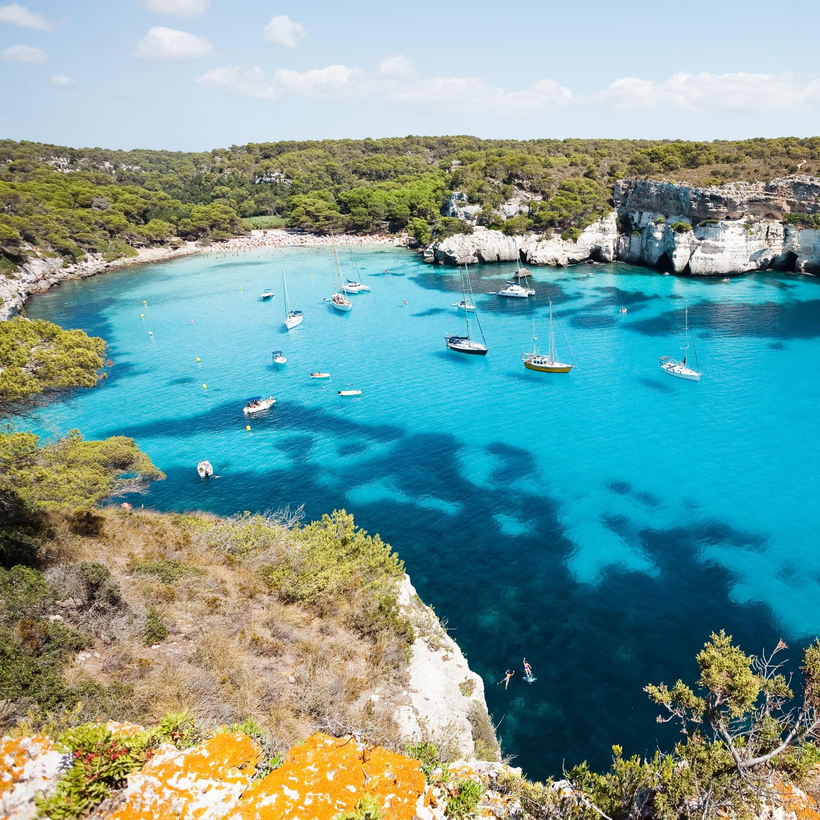The gardens of Faustino Gran, in the Minorcan port town of Ciutadella, smelled of jasmine; the stars were visible overhead. “The island is beautiful, but it was the humility and kindness of the Minorcans that made me fall in love with this island,” says hotelier Laurent Morel Ruymen. “There’s a solidarity and a sense of community that makes it one of the happiest and healthiest societies in the world.”
Morel Ruymen, the founder of Mare e Terra hotels, is not the only Frenchman who thinks so, either. He’s among a small, trendsetting tribe of French hoteliers who are turning the wildest and the quietest of the Balearic Islands into one of the most stylish destinations in the Mediterranean.

For the show-off, Instagram-worthy antics of Bodrum, Montenegro, or Mykonos, Minorca is still not the place to go. The most hedonistic thing to do at the area’s environmentally friendly, low-key hotels is listen to the whirring cicadas in the heat of the afternoon, slumping into a nap after a lunch of grilled rock lobster and a bottle of one of Minorca’s delicious white wines.

Guests at Faustino Gran as well as the new, 15-suite Cap Menorca can also enjoy the pools, or take out one of Morel Ruymen’s private boats. But hey—it’s often the only way to swim in the turquoise coves that indent Minorca’s coastline of sheer limestone cliffs.
A UNESCO biosphere since 1993, the 30-mile-long, 10-mile-wide island is a terrific destination for walkers. The recently renovated Camí de Cavalls, or Path of Horses, is a well-maintained, 116-mile footpath that circles the island.
With its many riding paths, Minorca is also well suited to equestrians; travelers can hire the island’s native black horses from one of its many stables.

With the 2021 opening of the striking gallery Hauser & Wirth Menorca, located in a decommissioned naval hospital on the Illa del Rei, in the port of Mahón, the island has become a destination for art lovers too. A small, pretty town with a well-known gin distillery called Xoriguer, Mahón contains Georgian-style town houses that reflect the period (from 1708 to 1802) when Minorca was ruled by Britain. The recent influx of creative young people has many locals now wryly describing it as “Little Berlin.”

It has retained its charm due to restrictions on development. With only around 96,000 residents, it’s the least populated major island in the Balearics. It was challenging for Guillaume Foucher and Frédéric Biousse, the hoteliers behind the beautiful Domaine de Fontenille, in Provence, to find a property to convert into a hotel.
Unable to decide between a 17th-century manor house, called Santa Ponsa, and Torre Vella, a fortified farm nearby, they bought both. They opened in 2019 as, respectively, 22-room and 17-room hotels. Santa Ponsa is quieter and more refined, with a crimson-painted façade and a swimming pool made from one of the farm’s antique cisterns; Torre Vella is a more rustic finca (farmhouse).

France’s rapidly expanding hospitality firm, Experimental Group, which has grown from a single Parisian cocktail bar to an international affair with properties in pulse-point destinations such as the Cotswolds, New York, Venice, and Verbier, has opened a 43-room agriturismo property on Minorca. This Palladian-style manor house, beautifully renovated by Paris-based designer Dorothée Meilichzon, has been drawing the style set since 2019. And next spring, Mare e Terra will welcome guests to yet another property: Finca Biniatram, an 18th-century finca that caters to the horsey set.
But, for the moment, the perfect place to land on Minorca is Faustino Gran, a collection of three renovated Renaissance houses. During the day, the hotel’s car will deposit guests at Casa de Pau, a farm with a swimming pool, restaurant, and easy access to one of the prettiest swimming coves on the island. In the afternoons and evenings, the charming cafés, boutiques, and excellent restaurants beckon. (Don’t miss Mon Restaurant.)

“The Minorcans welcome tourism, but they will fight hard to make sure it does not change their island,” says Morel Ruymen, sipping locally distilled hierbas, an herbal digestive, at the end of a summer night. May they continue to fight the good fight.
Rooms at Cap Menorca begin at $700 per night; rooms at Menorca Experimental begin at $315 per night, and rooms at Faustino Gran begin at $410 per night.
Alexander Lobrano is a Writer at Large at AIR MAIL. His latest book is the gastronomic coming-of-age story My Place at the Table: A Recipe for a Delicious Life in Paris


